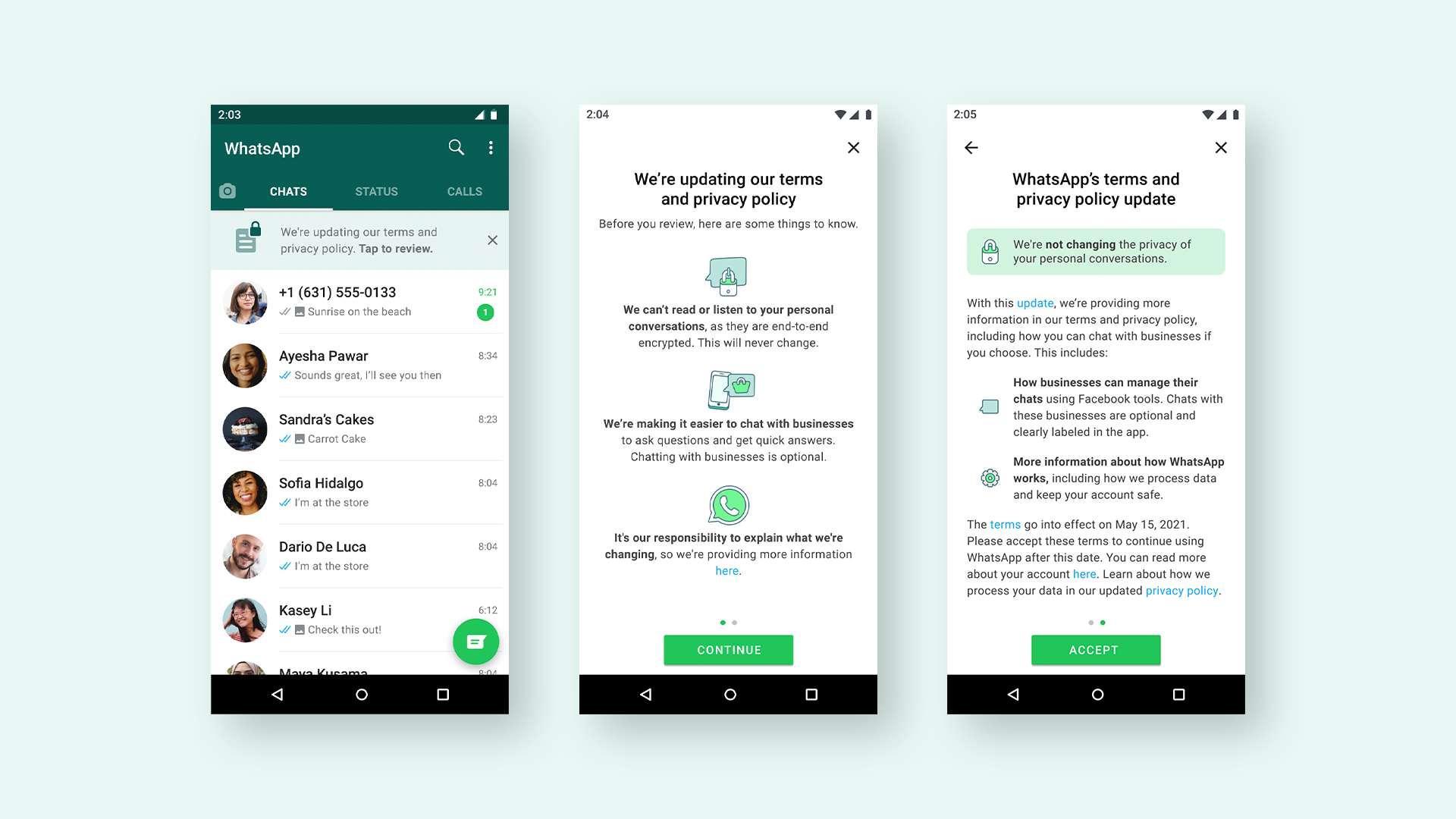WhatsApp presses ahead with privacy changes despite backlash
The news of the update resulted in millions of new downloads for rival services Telegram and Signal


Sign up today and you will receive a free copy of our Future Focus 2025 report - the leading guidance on AI, cybersecurity and other IT challenges as per 700+ senior executives
You are now subscribed
Your newsletter sign-up was successful
WhatsApp has said that a controversial change to its privacy terms that would see the creation of a limited data sharing agreement with its parent company Facebook will now going ahead as planned.
The update to WhatsApp’s privacy policy, which would allow the messaging platform to share some user data with Facebook, was supposed to come into effect on 8 February. However, public backlash prompted WhatsApp to delay the implementation by three months, to 15 May, in order to clarify the details of what the agreement would entail.
Under the new privacy policy, WhatsApp will be able to share limited user data with Facebook and its group firms in order to allow businesses to use the platform for customer service purposes.
However, the company said that this would not affect users' personal conversations and that it will be up to the user to decide whether they "want to engage with businesses, or not", according to a blog post on Thursday. It also added that it will "clearly label chats" in order to make users aware when businesses are managing their conversations using Facebook, and the implementation of the update will first result in the displaying of banners providing additional information on the new terms.

Accepting the new terms will be compulsory in order to continue using the messaging platform, a rule that last month led to millions of users downloading alternative apps such as Telegram and Signal.
As a result. WhatsApp fell from being the eighth most downloaded app in the UK at the start of the year, to the 23rd most downloaded by 12 January, when discussion around the update started gaining momentum.
By contrast, Telegram and Signal gained 25 million and 7.5 million users respectively during the same period, resulting in a brief crash of Signal's servers. However, it's unclear how many of these users still have WhatsApp installed, so it's difficult to assess how many users WhatsApp lost entirely as a result of the move.
Sign up today and you will receive a free copy of our Future Focus 2025 report - the leading guidance on AI, cybersecurity and other IT challenges as per 700+ senior executives
WhatsApp acknowledged that it “could have done better” and told users that it will be “doing much more to make [its] voice clear going forward” by using its app’s Status feature to share information on updates and company values directly to its users.
It also addressed the mass uptake in Signal and Telegram downloads, saying that it understands that “some people may check out other apps to see what they have to offer”.
“We’ve seen some of our competitors try to get away with claiming they can’t see people’s messages - if an app doesn’t offer end-to-end encryption by default that means they can read your messages," the company stated in its blog post. "Other apps say they’re better because they know even less information than WhatsApp. We believe people are looking for apps to be both reliable and safe, even if that requires WhatsApp having some limited data.
"We strive to be thoughtful on the decisions we make and we’ll continue to develop new ways of meeting these responsibilities with less information, not more,” it added.
Having only graduated from City University in 2019, Sabina has already demonstrated her abilities as a keen writer and effective journalist. Currently a content writer for Drapers, Sabina spent a number of years writing for ITPro, specialising in networking and telecommunications, as well as charting the efforts of technology companies to improve their inclusion and diversity strategies, a topic close to her heart.
Sabina has also held a number of editorial roles at Harper's Bazaar, Cube Collective, and HighClouds.
-
 Sumo Logic expands European footprint with AWS Sovereign Cloud deal
Sumo Logic expands European footprint with AWS Sovereign Cloud dealNews The vendor is extending its AI-powered security platform to the AWS European Sovereign Cloud and Swiss Data Center
-
 Going all-in on digital sovereignty
Going all-in on digital sovereigntyITPro Podcast Geopolitical uncertainty is intensifying public and private sector focus on true sovereign workloads
